Intro
Discover common low testosterone symptoms in men, including fatigue, low libido, and weight gain, and learn about diagnosis, treatment, and management of hypogonadism and andropause.
Low testosterone symptoms in men can have a significant impact on their overall health and well-being. Testosterone is a crucial hormone that plays a vital role in the development and maintenance of male reproductive tissues, bone mass, and muscle strength. As men age, their testosterone levels naturally decline, but some men may experience a more significant drop in testosterone, leading to a range of symptoms. Understanding these symptoms is essential for men to seek medical attention and receive proper treatment.
Testosterone is often referred to as the "male hormone" because it is responsible for the development of male characteristics, such as facial hair, deep voice, and muscle mass. However, testosterone also plays a critical role in maintaining bone density, regulating mood, and supporting cognitive function. When testosterone levels are low, men may experience a range of symptoms that can affect their daily lives. These symptoms can be physical, emotional, or psychological, and may include fatigue, low libido, erectile dysfunction, and mood changes.
The importance of recognizing low testosterone symptoms in men cannot be overstated. If left untreated, low testosterone can lead to a range of health problems, including osteoporosis, diabetes, and cardiovascular disease. Furthermore, low testosterone can also affect a man's mental health, leading to depression, anxiety, and decreased self-esteem. By understanding the symptoms of low testosterone, men can take proactive steps to address the issue and improve their overall health and well-being.
Causes of Low Testosterone
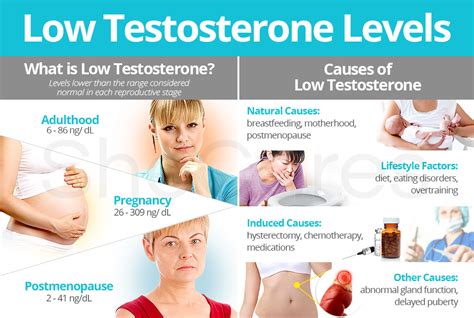
There are several causes of low testosterone in men, including aging, injury or trauma to the testes, certain medical conditions, and lifestyle factors. As men age, their testosterone levels naturally decline, with most men experiencing a significant drop in testosterone after the age of 40. Injury or trauma to the testes can also disrupt testosterone production, leading to low testosterone. Certain medical conditions, such as hypogonadism, pituitary gland problems, and diabetes, can also affect testosterone production.
Types of Hypogonadism
There are two types of hypogonadism: primary and secondary. Primary hypogonadism occurs when the testes are not producing enough testosterone, while secondary hypogonadism occurs when the pituitary gland is not producing enough hormones to stimulate the testes to produce testosterone. Understanding the underlying cause of low testosterone is essential for developing an effective treatment plan.Symptoms of Low Testosterone
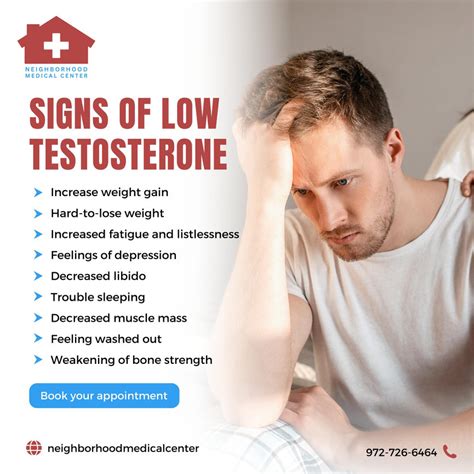
The symptoms of low testosterone can vary from man to man, but common symptoms include:
- Low libido or sex drive
- Erectile dysfunction or impotence
- Fatigue or low energy
- Mood changes, such as depression or anxiety
- Decreased muscle mass or strength
- Decreased bone density or osteoporosis
- Hair loss or thinning
- Decreased cognitive function or memory
These symptoms can have a significant impact on a man's quality of life, affecting his relationships, work, and overall well-being. By recognizing these symptoms, men can seek medical attention and receive proper treatment to address the underlying cause of their low testosterone.
Diagnosing Low Testosterone
Diagnosing low testosterone typically involves a combination of physical examination, medical history, and laboratory tests. A doctor will typically perform a physical examination to check for any signs of low testosterone, such as decreased muscle mass or hair loss. A medical history will also be taken to identify any underlying medical conditions that may be contributing to low testosterone.Treatment Options for Low Testosterone
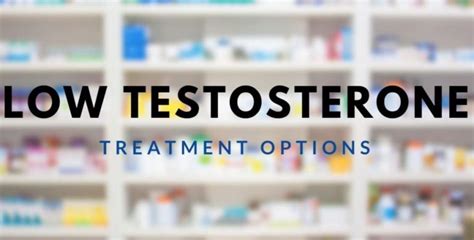
There are several treatment options available for low testosterone, including testosterone replacement therapy (TRT), lifestyle changes, and alternative therapies. TRT involves replacing the missing testosterone with synthetic hormones, which can be administered through injections, gels, patches, or pellets. Lifestyle changes, such as exercising regularly, eating a healthy diet, and getting enough sleep, can also help to boost testosterone levels.
Benefits and Risks of Testosterone Replacement Therapy
TRT can have several benefits, including improved libido, increased energy, and enhanced muscle mass. However, TRT can also have risks, such as acne, hair loss, and increased risk of blood clots. It is essential for men to discuss the benefits and risks of TRT with their doctor to determine if it is the right treatment option for them.Lifestyle Changes to Boost Testosterone
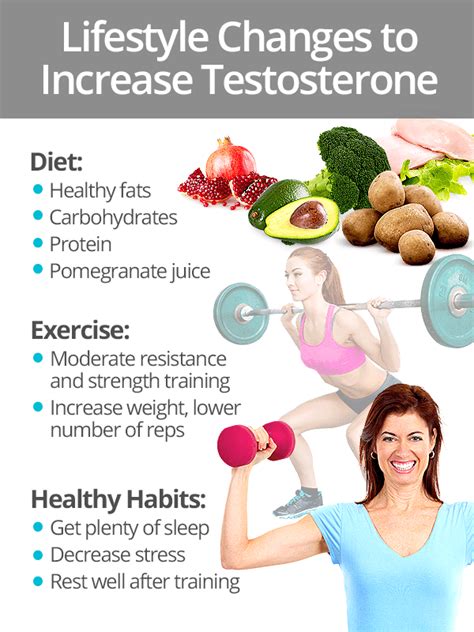
Making lifestyle changes can help to boost testosterone levels and alleviate symptoms of low testosterone. Some lifestyle changes that can help to boost testosterone include:
- Exercising regularly, particularly weight-bearing exercises
- Eating a healthy diet that is rich in protein, healthy fats, and complex carbohydrates
- Getting enough sleep, aiming for 7-9 hours per night
- Reducing stress, through techniques such as meditation or yoga
- Avoiding excessive alcohol consumption and smoking
These lifestyle changes can help to support testosterone production and overall health, reducing the risk of chronic diseases and improving overall well-being.
Supplements and Vitamins to Boost Testosterone
Certain supplements and vitamins can also help to boost testosterone levels, including: * Vitamin D: essential for maintaining healthy testosterone levels * Magnesium: helps to regulate testosterone production * Zinc: essential for maintaining healthy testosterone levels * D-aspartic acid (DAA): can help to boost testosterone production * Tribulus terrestris: may help to boost testosterone levelsHowever, it is essential to consult with a doctor before taking any supplements or vitamins, as they can interact with medications and have side effects.
Natural Remedies for Low Testosterone
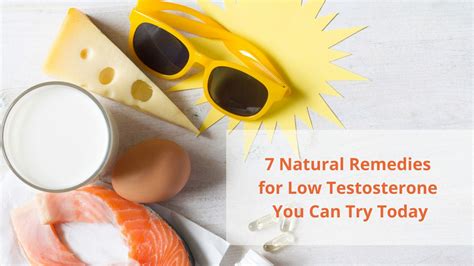
There are several natural remedies that can help to boost testosterone levels and alleviate symptoms of low testosterone. Some natural remedies include:
- Ashwagandha: an herb that can help to reduce stress and boost testosterone levels
- Ginseng: may help to boost testosterone levels and improve libido
- Maca: a plant that can help to balance hormones and boost testosterone levels
- Tongkat ali: a plant that can help to boost testosterone levels and improve libido
These natural remedies can be used in conjunction with lifestyle changes and medical treatment to support testosterone production and overall health.
Acupuncture and Low Testosterone
Acupuncture is a traditional Chinese medicine technique that involves inserting small needles into specific points on the body. Acupuncture may help to boost testosterone levels by stimulating the production of hormones and improving blood flow to the testes.What are the symptoms of low testosterone in men?
+The symptoms of low testosterone in men can include low libido, erectile dysfunction, fatigue, mood changes, decreased muscle mass, and decreased bone density.
How is low testosterone diagnosed?
+Low testosterone is typically diagnosed through a combination of physical examination, medical history, and laboratory tests, including blood tests to measure testosterone levels.
What are the treatment options for low testosterone?
+Treatment options for low testosterone include testosterone replacement therapy (TRT), lifestyle changes, and alternative therapies, such as acupuncture and natural remedies.
Can lifestyle changes help to boost testosterone levels?
+Yes, lifestyle changes, such as exercising regularly, eating a healthy diet, and getting enough sleep, can help to boost testosterone levels and alleviate symptoms of low testosterone.
Are there any natural remedies that can help to boost testosterone levels?
+Yes, there are several natural remedies that can help to boost testosterone levels, including ashwagandha, ginseng, maca, and tongkat ali.
In conclusion, low testosterone symptoms in men can have a significant impact on their overall health and well-being. By understanding the causes, symptoms, and treatment options for low testosterone, men can take proactive steps to address the issue and improve their quality of life. We encourage readers to share their experiences and ask questions in the comments section below. If you found this article helpful, please share it with your friends and family who may be experiencing low testosterone symptoms. Together, we can raise awareness and promote healthy living for men of all ages.
